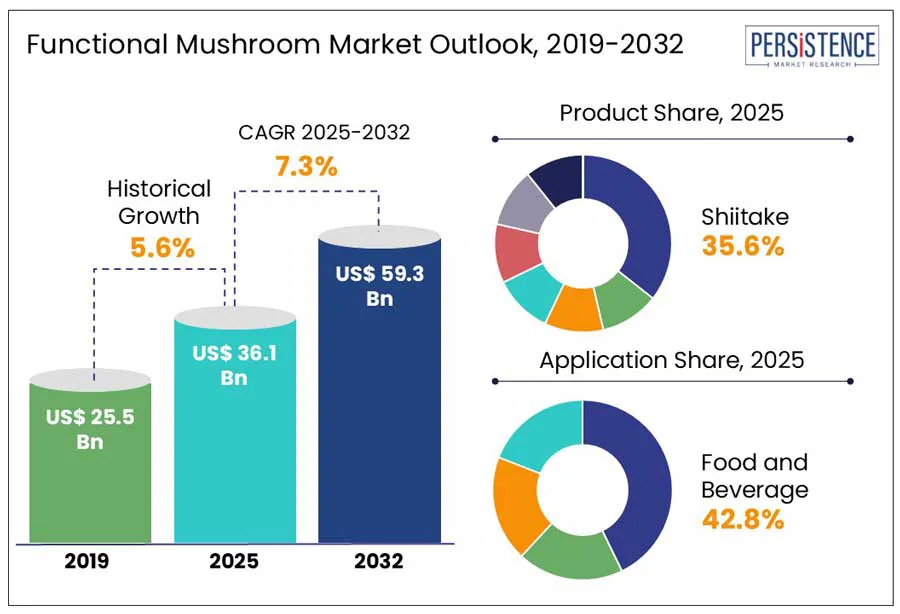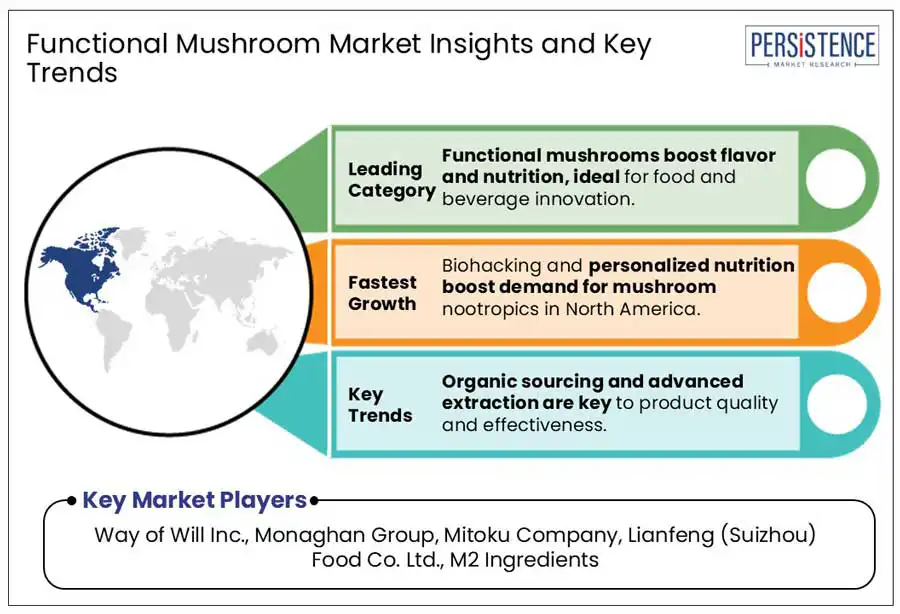ID: PMRREP35384| 197 Pages | 2 Jun 2025 | Format: PDF, Excel, PPT* | Food and Beverages

The global functional mushroom market size is predicted to reach US$ 59.3 Bn in 2032 from US$ 36.1 Bn in 2025. It will likely witness a CAGR of around 7.3% in the forecast period between 2025 and 2032, states Persistence Market Research.
Once relegated to ancient herbal medicine cabinets, functional mushrooms are now staging a quiet takeover of modern wellness culture. From adaptogenic chocolates and nootropic coffees to health drinks and skin serums, these bioactive fungi are no longer niche. The market will likely rise in the next 10 years with the changing consumer shift toward holistic, clean-label solutions. Key companies such as Unilever and Nestlé Health Science have recently extended their portfolios with mushroom-based products, pointing to a fungi revolution.

Key Industry Highlights
|
Global Market Attribute |
Key Insights |
|
Functional Mushroom Market Size (2025E) |
US$ 36.1 Bn |
|
Market Value Forecast (2032F) |
US$ 59.3 Bn |
|
Projected Growth (CAGR 2025 to 2032) |
7.3% |
|
Historical Market Growth (CAGR 2019 to 2024) |
5.6% |
Increasing popularity of functional mushroom powder-based coffee is predicted to change consumer expectations around both coffee and wellness products. The trend is propelling demand by positioning mushroom coffee as a dual-purpose beverage, providing specific health benefits and caffeine. Functional mushrooms such as cordyceps, chaga, and lion’s mane are increasingly being used for their potential to support energy levels, immunity, and cognitive function. This appeal to health-conscious consumers will likely help extend the market beyond conventional coffee drinkers.
The rising shift of modern consumers toward adaptogenic ingredients is one of the key market drivers. Four Sigmatic, a brand that combines chaga and lion’s mane with coffee, for instance, witnessed skyrocketing retail growth in 2024 alone, with robust presence in stores such as Whole Foods and Target. Similarly, start-ups, including MUDWTR and Ryze have capitalized on this trend by promoting functional mushroom coffee as a sustainable and jitter-free alternative to conventional coffee. Their direct-to-consumer success is predicted to encourage mainstream coffee brands to test similar formulations, thereby bolstering the market.
Concerns over gastrointestinal discomfort are emerging as a key hindrance to the functional mushroom market growth worldwide. The consumption of adaptogenic mushrooms such as cordyceps and reishi is often associated with cramping, nausea, or bloating for some individuals. These side effects are specifically observed in people new to fungal supplements or those with sensitive stomachs. A 2024 consumer review survey conducted by ConsumerLab revealed that around 18% of users of mushroom-based supplements reported mild to moderate digestive issues.
The potential for interactions with common medications is further anticipated to raise red flags among healthcare professionals. A few functional mushrooms have natural blood-thinning properties, which will likely amplify the effects of anticoagulant medications, including warfarin. The National Center for Complementary and Integrative Health (NCCIH), in its January 2025 safety bulletin, cautioned against unsupervised use of chaga by patients on antidiabetics or immunosuppressants. This is because of its ability to modulate blood sugar levels and immune response.
Several companies are focusing on integrating functional mushrooms in health supplements to diversify their portfolios and tap into niche health goals, including stress management and cognitive enhancement. They are striving to remain at the forefront of growth in the functional and organic mushroom market with new product launches. For example, Nature’s Way unveiled a new range of brain health capsules under its Brain Fuel line, which blends vitamin B12 and bacopa with lion’s mane. This approach is estimated to enable brands to market functional mushrooms as synergistic components in multitargeted supplements.
Start-ups are also leveraging this trend to strengthen their position in the mental wellness and sleep aid markets. For instance, Mindright, a brand backed by athletes such as JuJu Smith-Schuster, launched reishi-based adaptogenic gummies. These were made to target youngsters looking for non-pharmaceutical options to manage sleep irregularities and anxiety. Similar product launches are allowing emerging brands to present functional mushrooms as lifestyle enhancers instead of medicinal remedies.
Based on product, the market is segregated into reishi, cordyceps, lion’s mane, turkey tail, shiitake, chaga. Out of these, the shiitake segment is predicted to hold a share of approximately 35.6% in 2025. This is attributed to its proven benefits for immune modulation and cardiovascular health, which differentiates it from other mushrooms commonly associated with cognitive or stress-related claims. Shiitake’s relatively mild taste and established presence in culinary contexts also makes it convenient to incorporate into snack, broth, and gummy formats without the bitterness associated with other functional mushrooms.
Reishi mushroom extract market, on the other hand, is predicted to witness a significant CAGR from 2025 to 2032. This is due to its superior adaptogenic properties linked to hormonal balance and sleep regulation, areas of high consumer demand in the field of health and wellness. These distinct properties are pushing its frequent inclusion in nighttime formulations. For example, Olly, extended its popular sleep supplement line to include Reishi Calm gummies to target consumers demanding natural alternatives to melatonin-heavy sleep aids.
In terms of application, the market is trifurcated into food and beverage, dietary supplements, and pharmaceutical. Among these, the food and beverage segment will likely generate around 42.8% of the functional mushroom market share in 2025. Several brands are integrating functional mushrooms into everyday consumables such as ready-to-drink beverages, protein bars, chocolates, and coffee. This strategy is specifically effective among younger demographics who prioritize functionality but resist conventional supplement formats.
Pharmaceutical applications are gaining impetus, backed by rising clinical evidence supporting the bioactive compounds of functional liquid mushrooms, including Polysaccharide-K, triterpenoids, and beta-glucans. These compounds are currently being studied as potential primary treatments in oncological and immune-related conditions. For example, the University of Tokyo Hospital introduced a Phase II clinical trial to evaluate the efficacy of turkey tail-derived PSK in enhancing immune response during chemotherapy for colorectal cancer patients. The compound, already approved in Japan under the Krestin brand, is now being studied for wide pharmaceutical acceptance in the West.

In 2025, North America is expected to account for a share of nearly 34.2% due to rising consumer demand for plant-based, natural health solutions. The U.S. functional mushroom market will likely remain at the forefront of growth through 2032, spurred by increasing number of new product launches across supplements, beverages, and food categories. Trader Joe’s, for instance, recently introduced a new line of mushroom-based snacks and teas incorporating cordyceps and lion’s mane. This shows how big-box retailers in the country are adopting functional ingredients that were previously limited to specialty stores.
The chaga mushroom market, in particular, is gaining momentum in North America due to its potential for immune regulation and antioxidant profile. It has been featured in immune-focused beverages and supplements across areas with cold climate such as Alaska and Canada, where chaga is primarily grown. Of late, Rritual Superfoods, based in Vancouver, for instance, unveiled a chaga-based adaptogenic capsule to support skin health and lower oxidative stress. Its presence in caffeine-free, clean-label tea alternatives has also surged, catering to consumers seeking low-intervention wellness support.
In Europe, the market is gaining traction through a regulatory-conscious, science-backed approach, with surging integration of mushrooms into both functional food and nutraceutical sectors. Consumers in the region are inclining toward product transparency and clinical validation, unlike North America’s trend-led adoption. This is encouraging brands to invest in research collaborations and pursue European Food Safety Authority (EFSA)-compliant health claims. Germany-based MycoNutra Biotech, for example, partnered with the University of Vienna, to study the immunomodulatory effects of beta-glucans derived from shiitake and maitake mushroom substrates.
Apothecaries and pharmacies in the Netherlands, Austria, and Germany are further stocking mushroom-based supplements, mainly those targeting metabolic health, cognition, and immunity. A significant launch is NaturDrogeriet’s reishi-based stress support capsule, which was recently released in Denmark. It is specifically made for individuals experiencing adrenal dysregulation and chronic fatigue, a demographic often overlooked by conventional supplements. Similar innovations highlight increasing consumer trust in fungi-based solutions for everyday health across Europe.
In Asia Pacific, countries such as South Korea, Japan, and China have witnessed a steady growth as functional mushrooms, especially morel mushrooms have long-standing medicinal relevance. These countries are pushing the shift from conventional decoctions to science-backed functional products. Lately, Tokiwa Pharmaceutical, for example, launched a new range of mushroom-based nutraceuticals, focusing on anti-fatigue and immune resilience. The products include domestically sourced, traceable ingredients to meet the requirements of the aging population.
South Korea is currently leading in terms of innovation in mushroom-infused functional cosmetics and beverages. Amorepacific, for instance, introduced a reishi-infused skin serum under its luxury Vital Mushroom line, highlighting the ingredient’s skin barrier-supporting and anti-inflammatory properties. Various food start-ups in Asia Pacific are also experimenting with mycelium as a bioactive ingredient. Shandi Global, based in Singapore, began pilot testing meat analogues fortified with cordyceps extract, blending functional benefits with plant-based protein.
The functional mushroom market is highly competitive with the presence of various conventional herbal medicine companies, direct-to-consumer wellness start-ups, and reputed nutraceutical brands. Leading companies are investing in proprietary blends, dual extraction technologies, and controlled cultivation to stand out. Cross-industry collaborations and mergers are also transforming the competitive dynamics. These strategies are enabling both parties to tap into the high-trust segments of functional wellness.
The market is projected to reach US$ 36.1 Bn in 2025.
Increasing trend of mushroom infused coffee and rising demand for clean-label nutraceuticals are the key market drivers.
The market is poised to witness a CAGR of 7.3% from 2025 to 2032.
Development of new supplements to enhance sleep patterns and increasing research activities to launch innovative beverages are the key market opportunities.
Way of Will Inc., Monaghan Group, and Mitoku Company are a few key market players.
|
Report Attribute |
Details |
|
Historical Data/Actuals |
2019 - 2024 |
|
Forecast Period |
2025 - 2032 |
|
Market Analysis Units |
Value: US$ Bn/Mn, Volume: As Applicable |
|
Geographical Coverage |
|
|
Segmental Coverage |
|
|
Competitive Analysis |
|
|
Report Highlights |
|
|
Customization and Pricing |
Available upon request |
By Product
By Application
By Region
Delivery Timelines
For more information on this report and its delivery timelines please get in touch with our sales team.
About Author